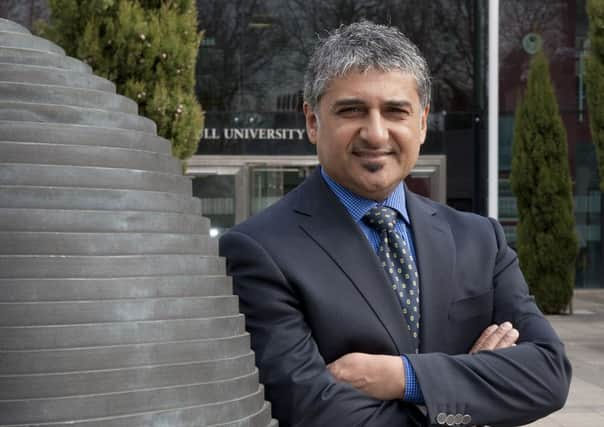Moroccan link with Hull opens up Africa to UK logistics


Staff from the university’s Logistics Institute have already begun work on two supply chain and logistics projects as part of a long-term collaboration with state-owned but privately managed transport company SNTL.
The partnership will utilise the extensive expertise of the Logistics Institute at Hull to develop a new index that can measure the potential of African countries to become logistics hubs.
Advertisement
Hide AdAdvertisement
Hide AdThe joint venture was agreed after Logistics Institute Director, Prof Amar Ramudhin visited Morocco to give a talk on emerging trends in the logistics sector.
Prof Ramudhin said: “This collaboration will give the university visibility in a modern, rapidly developing country in a key location for international trade.
“Currently, we don’t have a profile in French-speaking countries in Africa, so in that respect, it’s a first.
“For the Logistics Institute, it brings added credibility to be able to showcase our expertise in emerging countries such as Morocco. It builds on the work I have done before with Georgia Tech Panama to position that country as the logistics hub of the Americas.”
Advertisement
Hide AdAdvertisement
Hide AdSNTL Group chief executive Mohamed Benouda said: “We strongly believe in the potential for partnership between the Kingdom of Morocco and the UK.
“Economic relations between the two are booming. The UK is one of Morocco’s oldest trading partners and one of the top 10 foreign investors in the country. The Kingdom of Morocco, with its political stability and good economic performance, is already the largest partner of the UK in the Maghreb region.”
Fruit and vegetables have traditionally accounted for the majority of Morocco’s exports but last year cars and vans were the country’s biggest export via output from factories owned by Renault and Peugeot.
“The Moroccan economy has been heavily influenced by France but they are now looking to break free because they feel constrained by the French way of doing things,” explained Prof Ramudhin.
Advertisement
Hide AdAdvertisement
Hide Ad“The British Chamber of Commerce is now operational in Morocco and for the first time there is a direct link into the country for companies in Yorkshire.”
Professor Ramudhin hopes the logistics hub development index could become as important as the internationally acclaimed Logistics Performance Index (LPI) in judging the logistic state of countries.
Developed by the World Bank, the LPI is a benchmarking tool that helps countries identify the challenges and opportunities they face in trade logistics and what they can do to improve their performance.
The University of Hull and SNTL are also planning a follow up project where they will use the index to map the logistics capabilities of countries across Africa.
Advertisement
Hide AdAdvertisement
Hide AdProf Ramudhin expects to see an increasing number of people involved in Moroccan logistics arriving in Hull for post-graduate studies.
“If Morocco scores well in the index, they can use it as evidence to show the world their potential to be a major logistics hub for Africa,” he added.
“We also want to help them develop a suite of business intelligence products that go further than just reporting and to understand the types of value added services they can develop to offer to a wider portfolio of services.”
SNTL was founded in 1937 and is the leading company for freight transportation and warehousing in Morocco, with more than 20m tonnes of goods transported each year and an annual turnover of more than £60m. The company has a key role to play in Morocco’s ambition to become a major logistics hub for Africa.
Advertisement
Hide AdAdvertisement
Hide Ad“There is a synergy between Hull and Tangier because they are two historically important ports. Tangier is a modern container port that can handle the largest container ships,” said Prof Ramudhin.
“Morocco’s geography makes it a very attractive place for hub operations because it’s close to Europe, on a major trade route, has a great port and an excellent road network.
“As a stable country with a stable economy, it’s an attractive place to do business.
“The other area they want to develop is renewables, which has a direct link with East Yorkshire.
Advertisement
Hide AdAdvertisement
Hide Ad“Siemens have recently made a major investment in Morocco, as they have in Hull, and they were very excited to hear of the work the university is doing with Siemens.
“Morocco has just unveiled the largest solar farm in the world and has a lot of onshore wind turbines.
“It can be a leader in renewables for Africa, just as we can be a leader in offshore wind for Europe.”